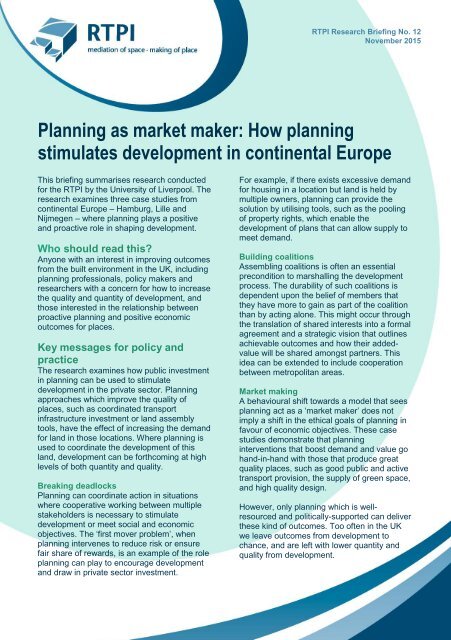rtpi_briefing_paper_12_planning_as_market_maker_november_2015
rtpi_briefing_paper_12_planning_as_market_maker_november_2015
rtpi_briefing_paper_12_planning_as_market_maker_november_2015
Create successful ePaper yourself
Turn your PDF publications into a flip-book with our unique Google optimized e-Paper software.
RTPI Research Briefing No. <strong>12</strong><br />
November <strong>2015</strong><br />
Planning <strong>as</strong> <strong>market</strong> <strong>maker</strong>: How <strong>planning</strong><br />
stimulates development in continental Europe<br />
This <strong>briefing</strong> summarises research conducted<br />
for the RTPI by the University of Liverpool. The<br />
research examines three c<strong>as</strong>e studies from<br />
continental Europe – Hamburg, Lille and<br />
Nijmegen – where <strong>planning</strong> plays a positive<br />
and proactive role in shaping development.<br />
Who should read this?<br />
Anyone with an interest in improving outcomes<br />
from the built environment in the UK, including<br />
<strong>planning</strong> professionals, policy <strong>maker</strong>s and<br />
researchers with a concern for how to incre<strong>as</strong>e<br />
the quality and quantity of development, and<br />
those interested in the relationship between<br />
proactive <strong>planning</strong> and positive economic<br />
outcomes for places.<br />
Key messages for policy and<br />
practice<br />
The research examines how public investment<br />
in <strong>planning</strong> can be used to stimulate<br />
development in the private sector. Planning<br />
approaches which improve the quality of<br />
places, such <strong>as</strong> coordinated transport<br />
infr<strong>as</strong>tructure investment or land <strong>as</strong>sembly<br />
tools, have the effect of incre<strong>as</strong>ing the demand<br />
for land in those locations. Where <strong>planning</strong> is<br />
used to coordinate the development of this<br />
land, development can be forthcoming at high<br />
levels of both quantity and quality.<br />
Breaking deadlocks<br />
Planning can coordinate action in situations<br />
where cooperative working between multiple<br />
stakeholders is necessary to stimulate<br />
development or meet social and economic<br />
objectives. The ‘first mover problem’, when<br />
<strong>planning</strong> intervenes to reduce risk or ensure<br />
fair share of rewards, is an example of the role<br />
<strong>planning</strong> can play to encourage development<br />
and draw in private sector investment.<br />
For example, if there exists excessive demand<br />
for housing in a location but land is held by<br />
multiple owners, <strong>planning</strong> can provide the<br />
solution by utilising tools, such <strong>as</strong> the pooling<br />
of property rights, which enable the<br />
development of plans that can allow supply to<br />
meet demand.<br />
Building coalitions<br />
Assembling coalitions is often an essential<br />
precondition to marshalling the development<br />
process. The durability of such coalitions is<br />
dependent upon the belief of members that<br />
they have more to gain <strong>as</strong> part of the coalition<br />
than by acting alone. This might occur through<br />
the translation of shared interests into a formal<br />
agreement and a strategic vision that outlines<br />
achievable outcomes and how their addedvalue<br />
will be shared amongst partners. This<br />
idea can be extended to include cooperation<br />
between metropolitan are<strong>as</strong>.<br />
Market making<br />
A behavioural shift towards a model that sees<br />
<strong>planning</strong> act <strong>as</strong> a ‘<strong>market</strong> <strong>maker</strong>’ does not<br />
imply a shift in the ethical goals of <strong>planning</strong> in<br />
favour of economic objectives. These c<strong>as</strong>e<br />
studies demonstrate that <strong>planning</strong><br />
interventions that boost demand and value go<br />
hand-in-hand with those that produce great<br />
quality places, such <strong>as</strong> good public and active<br />
transport provision, the supply of green space,<br />
and high quality design.<br />
However, only <strong>planning</strong> which is wellresourced<br />
and politically-supported can deliver<br />
these kind of outcomes. Too often in the UK<br />
we leave outcomes from development to<br />
chance, and are left with lower quantity and<br />
quality from development.
RTPI Research Briefing No. <strong>12</strong><br />
November <strong>2015</strong><br />
Wider context<br />
The value of <strong>planning</strong><br />
The UK Government h<strong>as</strong> set-out its key<br />
economic priorities to boost national<br />
productivity and ensure that economic growth<br />
is sustainable. Planning is an underused tool<br />
that can help achieve these goals, <strong>as</strong> the RTPI<br />
h<strong>as</strong> been examining in its programme of work<br />
on the value of <strong>planning</strong>.<br />
For example, we know that many of the<br />
outcomes produced by good <strong>planning</strong> are<br />
essential for a strongly performing economy.<br />
Good transport connectivity between homes<br />
and jobs provides greater economic<br />
opportunity and supply in the labour <strong>market</strong>.<br />
Places which support healthy lifestyles can<br />
produce more productive labour forces.<br />
Moreover, developing inclusive, safe and<br />
cohesive places can reduce the need for public<br />
expenditure on services like health and social<br />
care, crime prevention and security, whilst<br />
supporting stronger local economies.<br />
Greater investment in the kind of proactive<br />
<strong>planning</strong> that is too-rarely seen in the UK but is<br />
much more common in continental Europe can<br />
play a leading role in delivering the kinds of<br />
places that can boost local economic<br />
outcomes.<br />
Main findings<br />
Empowered <strong>planning</strong><br />
In the cities examined in the c<strong>as</strong>e studies in<br />
this research, <strong>planning</strong> h<strong>as</strong> been empowered<br />
with legislative, cultural and financial support.<br />
The results can be seen in terms of<br />
development quality and quantity, providing<br />
the foundations for sustainable, positive<br />
economic outcomes. Where <strong>planning</strong> is<br />
charged with positively engaging with the<br />
<strong>market</strong>, this enables responses to<br />
inconsistencies and <strong>market</strong> failures which a<br />
more p<strong>as</strong>sive, regulatory model of <strong>planning</strong> is<br />
ill-equipped to deal with.<br />
Coordinated <strong>planning</strong><br />
Nijmegen in the Netherlands illustrates how<br />
<strong>planning</strong> can be used to lead and coordinate<br />
development through the use of specific<br />
mechanisms that guide and stimulate the<br />
<strong>market</strong>.<br />
‘Land-readjustment’, a term used in the<br />
Netherlands to refer to a specific form of<br />
<strong>planning</strong> whereby land rights are temporarily<br />
pooled to deliver infr<strong>as</strong>tructure or collective<br />
area-benefits, delivers individual benefits to<br />
private land-owners that significantly outweigh<br />
those garnered from acting in isolation.<br />
In this model, risk is reduced for the public<br />
sector without the need to engage in resource<br />
intensive compulsory-purch<strong>as</strong>e procedures,<br />
and the processes involved in bringing private<br />
land-owners into cooperation often creates<br />
healthy coalitions which are able to share<br />
knowledge and ensure that the development<br />
closely reflects the interests of stakeholders.<br />
Leading with <strong>planning</strong><br />
In Hamburg in Germany, a strong guiding role<br />
for <strong>planning</strong> points to ways in which large scale<br />
developments can be used to channel private<br />
sector innovation and delivery to achieve<br />
higher overall development quality.<br />
As a result of the Länder (regional state) and<br />
the city developing a strong <strong>planning</strong> institution<br />
that w<strong>as</strong> able to undertake upfront land<br />
<strong>as</strong>sembly and infr<strong>as</strong>tructure provision, <strong>planning</strong><br />
w<strong>as</strong> able to shape the form and structure of<br />
development in the area, encouraging a<br />
density and quality which met the economic<br />
<strong>as</strong>pirations of the region.<br />
Planning coalitions<br />
Lille in France shows how <strong>planning</strong> institutions<br />
can be empowered to use strategic foresight<br />
and incentives for cooperation to overcome<br />
institutional deficiencies which might otherwise<br />
prevent coordinated development across<br />
jurisdictions.<br />
Coalition building, whereby neighbouring<br />
authorities pool resources in order to share out<br />
investment that would be greater than they<br />
could achieve in isolation, is crucial for the<br />
successful results achieved in the region.<br />
2
RTPI Research Briefing No. <strong>12</strong><br />
November <strong>2015</strong><br />
Strong <strong>planning</strong> institutions and tools,<br />
devolved funding, and local leadership that<br />
encourages strategic spatial <strong>planning</strong> is central<br />
to the delivery and maintenance of this model.<br />
Achieving better outcomes<br />
This research shows that such approaches to<br />
stimulating urban development can produce<br />
better quality, more sustainable built<br />
environments.<br />
Much recent research that explores the<br />
relationship between <strong>planning</strong> and the wider<br />
economy h<strong>as</strong> used a neocl<strong>as</strong>sical economic<br />
framework to investigate the ‘costs’ of<br />
<strong>planning</strong>. This type of analysis points to the<br />
constraints that <strong>planning</strong> is said to place on<br />
development, and so economic growth. This<br />
analysis h<strong>as</strong> been influential in some policy<br />
circles, contributing to the characterisation of<br />
<strong>planning</strong> <strong>as</strong> an overbearing regulatory function<br />
which supresses economic growth and<br />
contributes to our collective inability to provide<br />
sufficient housing at accessible prices.<br />
This is a false understanding of both what<br />
<strong>planning</strong> can achieve, and how land and<br />
property <strong>market</strong>s actually function. This<br />
research, which draws instead on behavioural<br />
economics, illustrates that in reality only strong<br />
<strong>planning</strong> institutions, where <strong>planning</strong><br />
professionals are well resourced, empowered,<br />
and supported, can routinely deliver more<br />
positive outcomes for places.<br />
Taking a wider international perspective points<br />
to the kind of outcomes that enhance<br />
economic performance through the creation of<br />
great places, and how this requires more<br />
<strong>planning</strong>, in particular proactive <strong>planning</strong>.<br />
Implications for policy<br />
Support locally-devised approaches and<br />
devolved decision-making<br />
Devolved decision making allows more<br />
<strong>planning</strong> solutions to be devised locally. Those<br />
currently involved in pursuing and delivering<br />
greater devolution settlements in the<br />
metropolitan regions of England should focus<br />
on how they can use <strong>planning</strong> most efficiently<br />
to deliver better built environment outcomes.<br />
As part of this, sharing best practice via digital<br />
forums could support the transfer of policy and<br />
<strong>planning</strong> approaches within and between<br />
regions and nations of the UK, <strong>as</strong> well <strong>as</strong><br />
across Europe. This will be essential<br />
supporting stronger local responses to<br />
<strong>planning</strong> and development issues.<br />
Since the General Election of <strong>2015</strong> and the<br />
Scottish Independence Referendum, the<br />
process of devolution of greater political<br />
powers to the various regions and nations of<br />
the UK h<strong>as</strong> continued. One of the core<br />
functions that a new arrangement of British<br />
city-regions should have is greater control over<br />
the ability to be more creative and strategic,<br />
with pooled resources for urban <strong>planning</strong>.<br />
In this context, ensuring continuity across and<br />
between territories will be essential if<br />
development of the built environment is not to<br />
be disrupted and piecemeal. It will be<br />
important to monitor the effects of this<br />
potentially highly variegated approach to the<br />
scales at which <strong>planning</strong> power is vested.<br />
Re-consider the use of development<br />
agencies<br />
Development agencies provide the chance to<br />
integrate public and private interests,<br />
especially in the c<strong>as</strong>e of large-scale or stalled<br />
developments. This research identifies the<br />
common role development agencies can play<br />
in kick-starting and managing development.<br />
The Town and Country Planning Association’s<br />
call for a reappraisal of the New Towns Act to<br />
create development corporations, <strong>as</strong> well <strong>as</strong><br />
the Labour Party’s Lyons Review, arrived at<br />
similar conclusions to the UK Government<br />
regarding the potential value of incorporated<br />
bodies to lead the development process.<br />
This research similarly points to the ways in<br />
which some of the UK’s continental neighbours<br />
have used development corporations/agencies<br />
to guarantee a consistency of focus in<br />
strategically important developments.<br />
3
RTPI Research Briefing No. <strong>12</strong><br />
November <strong>2015</strong><br />
Move from ‘instrumentalism’ to strategic<br />
<strong>planning</strong> in area development<br />
While strategic <strong>planning</strong> h<strong>as</strong> appeared and<br />
reappeared on numerous occ<strong>as</strong>ions during the<br />
post-War era, in the UK it h<strong>as</strong> tended to focus<br />
on the broad spatial pattern of development<br />
(for example, across a region) rather than<br />
taking a strategic view of the form taken by<br />
specific local developments.<br />
The strategic dimension in local area<br />
development should be informed by such<br />
factors <strong>as</strong> the use value of the built<br />
environment, the resilience of development to<br />
shocks (economic or broader issues such <strong>as</strong><br />
climate change) and the role of architecture<br />
and urban design in raising living standards.<br />
The kind of behavioural shift illustrated by the<br />
c<strong>as</strong>e studies included in this research, from<br />
goal-specific regulation to strategic<br />
intervention, could contribute to achieving<br />
these aims.<br />
Further research on the implications of<br />
local government reform<br />
The reforms affecting local government across<br />
the UK are likely to have profound effects on<br />
the behaviours of local actors, including the<br />
creation of more autonomous and<br />
entrepreneurial local authorities in some c<strong>as</strong>es<br />
covering city-regional territories much greater<br />
in size than the inherited boundary settlement.<br />
About the research<br />
This <strong>briefing</strong> is b<strong>as</strong>ed on research conducted<br />
by Dr Alex Lord, Dr Phil O’Brien with Dr Olivier<br />
Sykes and Dr John Sturzaker of the University<br />
of Liverpool, commissioned <strong>as</strong> part of the<br />
RTPI’s Small Project Impact Research (SPIRe)<br />
fund. The research included a literature review<br />
and interviews with local leaders in the c<strong>as</strong>e<br />
study locations.<br />
The full report is available on the RTPI website<br />
at: www.<strong>rtpi</strong>.org.uk/<strong>planning</strong><strong>as</strong><strong>market</strong><strong>maker</strong><br />
About the RTPI<br />
The Royal Town Planning Institute holds a<br />
unique position in relation to <strong>planning</strong> <strong>as</strong> a<br />
professional membership body, a charity and a<br />
learned institute. We have a responsibility to<br />
promote the research needs of spatial <strong>planning</strong><br />
in the UK, Ireland and internationally.<br />
More of the RTPI’s work on the value of<br />
<strong>planning</strong> can be found at:<br />
www.<strong>rtpi</strong>.org.uk/valueof<strong>planning</strong><br />
You are also welcome to email us at:<br />
research@<strong>rtpi</strong>.org.uk<br />
This research points to the dilemm<strong>as</strong> these<br />
incre<strong>as</strong>ed powers and spheres of influence<br />
create. The degree to which the changing<br />
landscape of local government in the UK<br />
prompts a corresponding change in focus in<br />
how development is stimulated and supported,<br />
including the role of <strong>planning</strong>, should be a<br />
priority for further research.<br />
4




